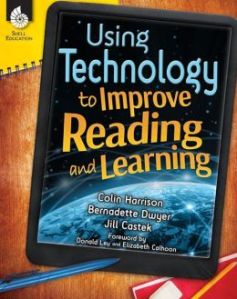Phi Delta Kappan has just published a themed issue on “Literacy Instruction in a Brave New World” (November, 2014, volume 96, No. 3). For a short time period, you may view and download all of the articles online, for free.
http://pdk.sagepub.com/content/current
As literacy and technology expert Mike McKenna states in the opening to his article,
“Technology integration into language arts instruction has been slow and tentative, even as information technologies have evolved with frightening speed. Today’s teachers need to be aware of several extant and unchanging realities: Technology is now indispensable to literacy development; reading with technology requires new skills and strategies; technology can support struggling students; technology can transform writing; technology offers a means of motivating students; and waiting for research is a losing strategy.”
We have a lot to learn, a lot to accomplish, and we need to pick up the pace! I found this issue both practically valuable and thought provoking.
Please go to the Kappan website http://pdk.sagepub.com/ and search for the current November 2014 issue, or click on http://pdk.sagepub.com/content/current to go directly to the table of contents. I’ve listed the table of contents below (note that Jill has a piece on online inquiry and I have a piece on eText and eBooks). Enjoy!
Literacy Instruction in a Brave New World – Table of Contents
Michael C. McKenna, Literacy instruction in the brave new world of technology
Joan Richardson, Maryanne Wolf: Balance technology and deep reading to create biliterate children
Christopher Harris, Fact or fiction? Libraries can thrive in the Digital Age
Samina Hadi-Tabassum, Can computers make the grade in writing exams?
Melody Zoch, Brooke Langston-DeMott, and Melissa Adams-Budde, Creating digital authors
Bridget Dalton, E-text and e-books are changing literacy landscape
Diane Carver Sekeres, Julie Coiro, Jill Castek, and Lizabeth A. Guzniczak. Wondering + online inquiry = learning
Gail Lynn Goldberg, One thousand words, plus a few more, is just right
Kristin Conradi, Tapping technology’s potential to motivate readers
Filed under: Dalton, digital reading, digital tools, electronic texts, multimodal, new literacies, technology integration, Uncategorized, universal design for learning, writing | Tagged: Dalton, eBooks, eText, multimodal, new literacies, struggling readers | Leave a comment »




